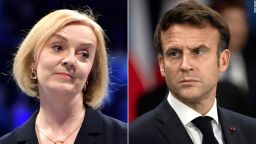Editor’s Note: David A. Andelman, a contributor to CNN, twice winner of the Deadline Club Award, is a chevalier of the French Legion of Honor, author of “A Red Line in the Sand: Diplomacy, Strategy, and the History of Wars That Might Still Happen” and blogs at Andelman Unleashed. He formerly was a correspondent for The New York Times and CBS News in Europe and Asia. The views expressed in this commentary are solely those of the author. Read more opinion at CNN.
Vladimir Putin is doing his best to strong-arm Europe. That’s the only way to look at the comments made Monday by his Kremlin spokesman Dmitry Peskov that Russian natural gas won’t begin flowing again through the huge Nord Stream 1 pipeline until the West lifts it sanctions against Russia. This latest move has “significantly increased the risk that Europe may not get further gas flows through Nord Stream 1 for the whole winter,” analysts at energy consultancy Rystad Energy said in a research report cited by CNBC.
There’s no other name for this than extortion. That’s a bad idea in the short run for Europe and in the long run for Russia.
The West imposed sanctions against Moscow after Putin’s troops invaded Ukraine in February. Putin, of course, has never been very adept at playing the long game. His short game, however, has inflicted no end of pain and suffering. This is certainly the case for Europe. But for a whole host of reasons, Europe and the West have to stand firm and united. It’s the only real way of countering a bully.
Europe has reacted quickly and decisively. Even before Peskov’s remarks, much of the continent had begun implementing measures to soften the blows of cutbacks that had already started and the soaring energy prices and inflationary fallout that is impacting millions. The front page of France’s Le Monde newspaper on Monday carried the banner headline, “Price of energy: European states mobilize.” Inflation in the Eurozone is at 9.1% – more than four times the 2% target – and a Reuters survey suggests that the continent is “almost certainly entering a recession.”
Meanwhile, at a meeting Monday of oil ministers from the core OPEC nations, as well as other major oil producers including Russia, the decision was made to cut output targets by the relatively small – but not insignificant – amount of 100,000 barrels per day. This move was just the opposite of OPEC’s pledge that it would increase output by that amount following President Joe Biden’s controversial “fist bump” summit with Crown Prince Mohammed bin Salman at the Al Salam Royal Palace in July. The meeting was a bad idea, now made even worse. Within minutes, Monday’s OPEC action sent oil prices soaring 3% on world markets.
To cope with these challenges, from the rising costs of energy to the bleed-through of skyrocketing inflation, a number of countries have begun taking radical steps. On Sunday, the federal government in Berlin announced a $65 billion relief plan to help German households. Britain’s new Prime Minister Liz Truss is contemplating a similar rescue plan which financial ministry insiders told the Sunday Times would likely exceed £100 billion ($115 billion).
A gathering of European energy ministers on September 9 will feature discussion of a plan to cap natural gas prices across the continent. And G-7 energy ministers agreed to impose a price cap on Russian oil and oil products beginning in December, designed to cut the Kremlin’s revenues and weaken Russia’s financial underpinnings while allowing its oil to continue supplying world markets.
Also on Monday, leaders from two of the continent’s pillars, French President Emmanuel Macron and German Chancellor Olaf Scholz held a video conference to discuss energy. In a press conference after the meeting, Macron told reporters they had reached a deal: France will supply Germany with its surplus gas, and in exchange, Germany will send France electricity it generates. Macron also urged residents of France to reduce their energy consumption by 10%. Cutoffs, or rationing, he said, would be “only a last resort.”
But the pain is not likely to subside anytime soon. The euro plunged to a 20-year low against the dollar early Monday after Peskov’s remarks. Already the European Central Bank is contemplating introducing a sharp 50 or 75 basis point increase in continent-wide lending rates when it holds a meeting on Thursday, mirroring the path the US Federal Reserve has been on for months. “A hawkish shift,” as London’s Financial Times put it. “There are no doves left at the ECB, only average hawks and uber-hawks,” Katharina Utermöhl, senior European economist at German insurer Allianz told the FT. The bank might even begin shrinking its €9 trillion balance sheet of securities.
Europe does have other alternatives, although they are less appealing and less impactful, to be sure. Soviet-era pipelines are still seeing a flow of natural gas through Ukraine, uninterrupted despite the Russian invasion and the objections of Ukraine’s leaders, through Turkey. Increased supplies from North Sea oil wells controlled by Norway and Britain could help Europe get through, until such time, perhaps, that reason might return in the Kremlin. But renewed drilling in the North Sea could prove highly controversial because of longstanding environmental concerns.
It’s certainly a price worth paying, but the pain will be severe and there have already been rumblings of pushbacks. Matteo Salvini, leader of Italy’s far-right League party, claimed over the weekend that sanctions had actually helped Russia accumulate a payment surplus of $140 billion while damaging the economy of Europe – especially Italy’s. “I would not want the sanctions to harm those who impose them more than those who are hit by them,” Salvini proclaimed. Salvini’s League is united in a coalition with other right-wing Italian parties that hold a substantial lead in the run-up to September 25 national elections there, according to a Politico poll.
Get our free weekly newsletter
Appropriately, Ukraine and much of official Europe are resisting calls to roll back sanctions. Ukraine’s President Volodymyr Zelensky, in a phone conversation with European Union Commission chief Ursula von der Leyen, has pressed Europe to tighten the screws on Russia even further with a new round of sanctions.
A strong will is essential at the ballot box and in ministries and parliaments across the continent. Putin has substantial support in some still-isolated quarters. There must be an equally profound understanding by the West of how steep the price would be for any retrenchment in the face of Russian bluster.



